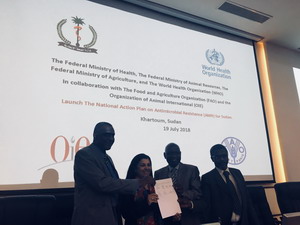 22 July 2018 – Sudan’s Federal Ministry of Health, Ministry of Animal Resources and Fisheries, Ministry of Agriculture and Forestry and WHO, in collaboration with the Food and Agriculture Organization of the United Nations, World Organisation for Animal Health and the United Nations Environment Programme, have launched the Sudanese national action plan on antimicrobial resistance (AMR).
22 July 2018 – Sudan’s Federal Ministry of Health, Ministry of Animal Resources and Fisheries, Ministry of Agriculture and Forestry and WHO, in collaboration with the Food and Agriculture Organization of the United Nations, World Organisation for Animal Health and the United Nations Environment Programme, have launched the Sudanese national action plan on antimicrobial resistance (AMR).
National and international partners and stakeholders from the fields of human health, animal health, agriculture and environment participated in the launch event in Khartoum.
The national action plan will contribute to the timely and effective management of AMR in Sudan and further ensure achieving the targets for universal health coverage in the country.
“The Federal Ministry of Health is grateful for the technical advice and efforts of WHO over the past 3 years in engaging all key partners to support the finalization of the national AMR plan, based on robust assessment. The document is a vivid example of implementing the Health in All Policies signed by the President of Sudan; this plan will address a serious public health problem affecting human and animal health in the country,” said His Excellency Ustad Bahar Idris Abu Garda, Sudan’s Federal Minister of Health. “Our goal is to protect our population against the threat of AMR and to provide comprehensive health care services through applying preventive methods, effective treatment and rational use of medicines and antibiotics,” he added.
AMR is rising to dangerously high levels in all parts of the world, compromising the treatment of infectious diseases and undermining numerous advances in health and medicine. It represents one of the biggest threats to global health today and can affect anyone, of any age, in any country.
However, human actions – such as the inappropriate prescription and use of antimicrobials, poor hospital hygiene, and inappropriate use of antimicrobials in livestock, added to irresponsible manufacturing of antibiotics including the uncontrolled release of active antibiotics into the environment – have promoted the spread of infections that are resistant to antimicrobial medicines and are a global threat to public health.
“If we don’t take action now, we will go back to the time when the simplest infections led to death,” said Dr Naeema Al Gasseer, WHO Representative in Sudan. “WHO, alongside the Federal Ministry of Health and all other partners and stakeholders, are committed to stepping up actions against global AMR. If we do not act quickly, WHO’s estimate shows that by 2050, 10 million people will die worldwide each year as a result of AMR. The global economy will also suffer, where it is expected that US$ 100 trillion of production will be lost between now and 2050”, she added.
Efforts to contain AMR will contribute not only to the achievement of Sustainable Development Goal (SDG) 3 through ensuring healthy lives and promoting well-being for all at all ages, but also to other SDGs.
The national action plan to contain AMR focuses on 5 strategic objectives aligned with the Global Action Plan. These include:
- improving awareness and understanding of AMR through effective communication, education and training;
- strengthening the knowledge and evidence base on surveillance and research;
- reducing the incidence of infection through effective sanitation, hygiene and prevention measures;
- optimizing the use of antimicrobial medicines in human and animal health;
- preparing the economic case for sustainable investment and increasing investment in new medicines, diagnostic tools, vaccines and other interventions.
For more information, please contact:
Ajyal Sultany
WHO Communications Officer
+246 900907512
This e-mail address is being protected from spambots. You need JavaScript enabled to view it
About WHO
WHO is a specialized public health organization mandated to provide the most reliable and evidence-based technical assistance, strategic and operational guidance to countries worldwide.
WHO works closely with Sudan’s Ministry of Health and related sectors on daily bases to identify priorities and guide the health sector on preparedness, effective and efficient response to health and health care requirements.
For more information on WHO and its work in Sudan, visit: http://www.emro.who.int/countries/sdn/index.html



